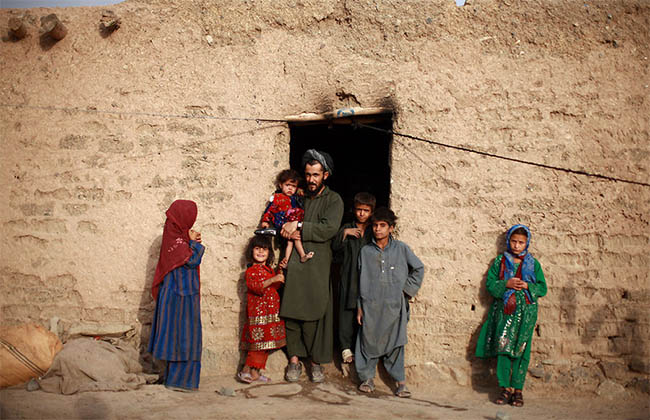Afghanistan is on the 11th highest birth rate in the world, and also the highest birth rate in non-African countries. The first country with the highest birth rate is Niger, a western African country, (at 51.26 births per 1,000 people) but the country with the lowest birth rate is Monaco, at 6.72 births per thousand comparing to Afghanistan has roughly 40 births/1,000 population. Birth rates ranging from 10–20 births per 1,000 are considered low, while rates from 40–50 births per 1,000 are considered high. There are problems associated with both extremes; high birth rates may stress government welfare and family programs. Additional problems faced by a country with a high birth rate include educating a growing number of children, creating jobs for these children when they enter the workforce, and dealing with the environmental impact of a large population. Low birth rates may stress the governments to provide adequate senior welfare systems or stress families who must support the elders themselves. There will be fewer children (and a working-age population) to support an aging population.
Afghanistan, as one the most rapid population growth, faces serious problem such as being unable to provide education, employments, maternal, infant health and etc. Some link this mindset to religion, culture and traditions but the main reasons are the social security demand and the low level of awareness in Afghanistan. In regard to social security demand, there is a kind of competition amongst family, especially in the rural areas, to have several sons and form stronger family; because small families are considered weak and easily aggressed by rural powerbrokers or rivals. Those who have few sons, think that they are weaker than the families having several sons. Therefore, they endeavor to have the same number of sons and term it a big magnificence in the society. The women are victims of such unsound competitions. As a result, women are impelled to respect the demand and inevitably deliver several babies without observing birth space. The average birth rate per family in Afghanistan is 5.22 babies, but the topmost is 10 children. This trend has been continued from past up to now, without evaluation of its future ruinous affects in a family and society.
In addition to complicated pregnancies, inaccessibility to primary healthcare services, insufficient numbers of health workers, early marriages, insecurities, poverty and unemployment, the high birthrate is counted as major factor for children and maternal mortality rate in Afghanistan. According to a survey of the “Save the Children” about the children and mothers’ situation in the world (investigated over 179 countries) Afghanistan ranked 152. According to this report, Afghanistan is a country where the life condition is not promising for women and children. As per the survey report of the World Health Organization, still Afghanistan kept the highest record of child and maternal mortality rate in the region due to lack of accessibility to required healthcare services and other factors. According to the figures released by the ministry of public health, as many as 1,600 mothers died in every 100,000 while giving birth to a baby or as result of pregnancy-related problems. The majority of young mothers lost their lives during pregnancies, because they give birth before age of 18. These category girls always have been victim of violence and ignorance. They are compelled to marry for money or given as Bad (to resolve a tribal conflict).
Repeated pregnancies without adequate space between births not only endanger life of mother and baby, but also deprive these women of enjoying motherhood in its true sense. Women burdened by large families and battling various illnesses in their productive years fail to realize and harness their potential and are unable to raise their children in a healthy environment. Whereas, Afghanistan has the highest maternal and child mortality rates in the world also faces the challenge of population explosion. So far there is no exact figure about its population on the hand. Family analysts believe that lack of family planning methods will result that Afghanistan would have uncontrolled population in the next 50 years.
However, the numbers of midwives have been increasing in the country but not enough to reduce the maternal mortality rate yet. Comparing to the past, Maternal mortality in Afghanistan has been decreased up to five percent in recent years, but still we have long way to overcome this problem. Still, one in every five women in the country dies from a pregnancy-related cause during her life time. Insecurity, low level of awareness among women about healthcare service during pregnancy, lack of professional health workers in the remote districts, shortage of transportation and inappropriate traditions are the major challenges that can be pointed out.
To cope with challenges, the national policy makers, religious scholars and media can play major roles in dispelling wrong concepts of high birthrate in Afghanistan. No religion says that a woman shall bear a child even if mother is mentally and physically unhealthy; as one of most important principle in Islam is not to impose any loss to any human being. So, when Health experts advise that women should observe three to five year spaces between each birth because multiple pregnancy affect health of the mother and newborn baby then it is on contrary to Islamic teaching if we disrespect the advice of experts. Family planning must be suggested as a first pillar of safe motherhood and doctors should undertake major responsibility to educate and encourage women, especially those who are admitted for a delivery, to use contraceptives. Finally, if we cannot find ways to lower the birth rate, the war, famine, pestilence will find us to increase the death rate which is more unpleasant!
Home » Opinion » High Birthrate Causing High Death Rate
High Birthrate Causing High Death Rate
| Mohammad Zahir Akbari

